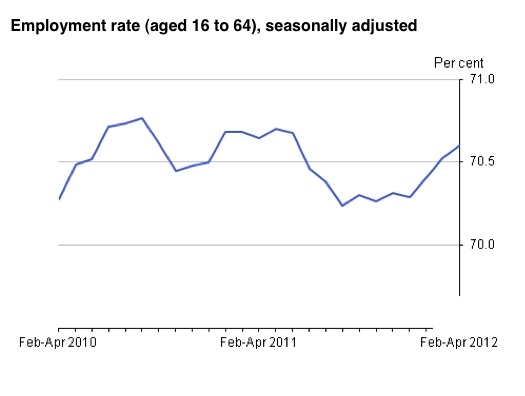
Jobless total falls to 8.2 per cent, down 0.2 per cent on quarter

The latest UK unemployment figures showed an unexpected fall in unemployment to 8.2 per cent with the number of people out of work falling by 51,000.
However, while unemployment fell there was an increase in youth unemployment and part-time working also grew.
According to ONS, the employment rate for those aged from 16 to 64 for the three months to April 2012 was 70.6 per cent, up 0.3 on the quarter.
The number of people in employment aged 16 and over increased by 166,000 on the quarter to reach 29.28 million, the largest quarterly increase since the three months to August 2010.
The number of people in employment was 291,000 lower than the pre-recession peak of 29.57 million recorded in March-May 2008.
ONS said the number of full-time workers increased by 82,000 to reach 21.32 million and the number of part- time workers increased by 83,000 to reach 7.97 million. The number of people (excluding unpaid family workers and government supported trainees) who were working part-time because they could not find a full-time job increased by 25,000 on the quarter to reach 1.41 million.
The number of people employed in the private sector increased by 205,000 to reach 23.38 million but the number of people employed in the public sector fell by 39,000 to reach 5.90 million, the lowest figure since March 2003. The number of self-employed people increased by 84,000 over the quarter to reach 4.17 million, the highest figure since comparable records began in 1992.
The unemployment rate for the three months to April 2012 was 8.2 per cent of the economically active population, down 0.2 on the quarter. The total number of unemployed people fell by 51,000 over the quarter, but increased by 185,000 on the year, to reach 2.61 million.
The quarterly fall in total unemployment was due to a fall of 99,000 in the number of people unemployed for up to six months to reach 1.21 million, while the number of people unemployed for more than six months increased by 49,000 to reach 1.41 million.
The number of unemployed men fell by 49,000 on the quarter to reach 1.49 million while the number of unemployed women was little changed on the quarter at 1.12 million.
In May 2012 there were 1.60 million people claiming Jobseeker’s Allowance (JSA). This was up 8,100 compared with April, but was 4,700 lower than the figure for March. The number of JSA claimants increased by 96,300 between May 2011 and May 2012 but has been broadly flat since October 2011.
The whole economy earnings annual growth rate for total pay was 1.4 per cent in the three months to April 2012. Bonus payments in April 2012 were slightly higher than in April 2011, partly reflecting a change in the timing of bonus payments. However over the five month period from December 2011 to April 2012 bonus payments were lower than in the same period a year previously. The majority of bonus payments, particularly in the financial sector, are usually made between December and April.
• New joint research from the Financial Skills Partnership and Career Academies UK, based on a survey of 17 and 18 year old Career Academies UK students, shows that many young people hold views about careers and how to progress which are simply not based on evidence.
According to the report, entitled Routes to Success, young people lack awareness of their options, including a misunderstanding of university fees, apprenticeships and school leaver programmes and that many young people are making poorly informed choices which may affect their future career options and the talent pipeline for many industries. The report calls on Government, educators and employers to take concrete steps to address these issues and suggest that they need to have a single coherent message on progression routes.
Official unemployment figures released last month by the Office for National Statistics show there was a slight decline in the number of people out of work. However, there are still too many young people, from school leavers to graduates, unemployed and searching for a job or training.
Liz Field, CEO of the Financial Skills Partnership, said, “Young people are making poorly informed choices, which may affect their future career options and the talent pipeline for many industries. The research shows that many young people know far too little about their potential career options, and that employers, educators and the government could all do more to help. We need to equip young people with the knowledge and skills to take responsibility for their own career planning and progression, if they are to be the professionals of tomorrow, able to lead us out of recession and into growth and renewal.”
After the report is published on Wednesday, it will be officially launched at the Career Academies UK National Conference on 21 June.
James McCreary, CEO of Career Academies UK, said, “Having gained a snapshot of young people’s views, FSP and Career Academies UK will be pleased to discuss its implications with all interested organisations. Educators and advisors need to become more fully aware themselves of the full range of routes for young people, so as to give genuinely impartial advice and guidance. Employers need to communicate that work experience and internships offer genuine and meaningful opportunities to young people, as well as communicating, and ensuring, that apprenticeships and school leaver programmes provide potential for progression.”
